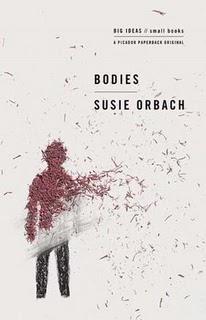Bodies

In Bodies, Susie Orbach, best known for her continuous thread of psychoanalytic discussion of the body particularly as rooted in eating disorders and feminism, offers up a broader discussion of bodies in our time. For Orbach, that time is the age of late capitalism where bodies no longer perform work or produce, but are the element of production themselves: “The body is turning from being the means of production to the production itself.”
Addressing not only the psychologists’ terrain of investigating eating disorders and bodily control, but also the wave of body modification standards in contemporary culture that range from surgeries and tattoos to the mediated (re)production of such bodies (she disturbingly references a children’s portrait studio that remakes and retouches even small babies’ photographs, taking the “airbrushed model” to a whole new level), Orbach delves into territory Elizabeth Grosz, Kathleen LeBesco, and even Laura Kipnis have tread.
Orbach offers, however, a turn to question Freud and moves to incorporate this newly produced (rather than producing) body as the entre to a discussion of development theory. Although her insights are thoughtful and do carefully characterize the turn to reconsider the body as not merely a canvas, but also as an active player in the construction of culture, they are not entirely new.
Orbach has long been an originating voice in the theoretical discussion of the body, and she adeptly uses her expertise to stretch the conversation to more contemporary questions of the body. She dips carefully into surgery, her own field of eating disorders, and even the contemporary attention to avatars and bodies that aren’t bodies at all, yet function in cyberspace (touching boundaries with Donna Haraway). Orbach’s conclusions also revive a conversation on the body and sex that Kipnis tried to enliven just a few years ago.
Bodies is useful and careful in its framing of these issues on the body. The book serves as a summary of much of the work that already exists on the subject and neatly brings many threads together under a broader conversation of the power the body has—moving away from a far more simplistic “mind-body” analysis. It is a useful survey, but not necessarily a set of innovative theorizing.
Thanks, Julie, for a nice review of a book I'll now surely try to get. I'm an online bookseller and had just literally uploaded her 1978 classic, Fat is a Feminist Issue, when I ran across your review. It's nice to see a review mentioning the fine works of Grosz and of course Haraway, two heroes of mine. I'll be curious to see the connective threads between Fat and this book. Cheers. Lawrence Hammar